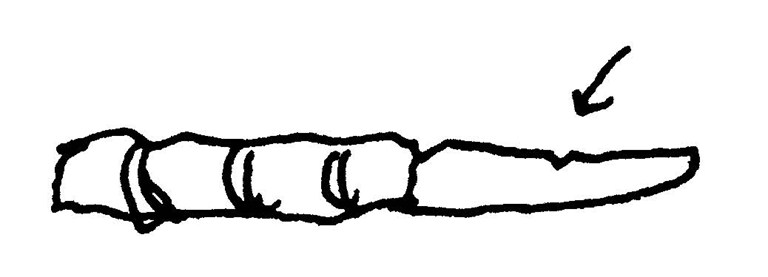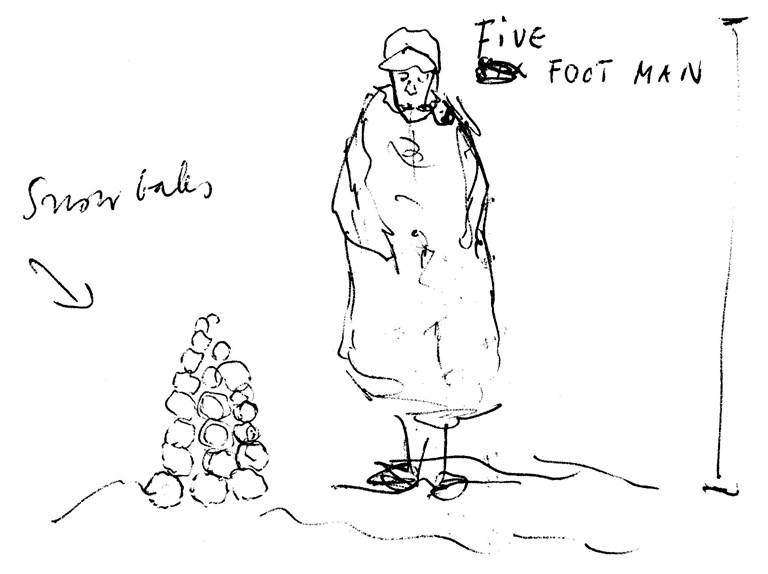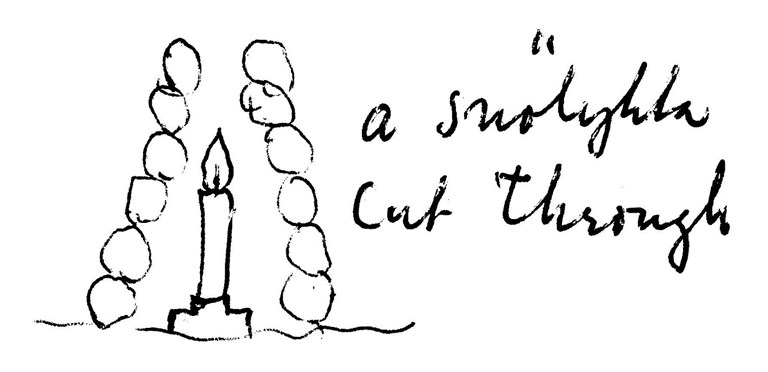Airmail (27 page)
Authors: Robert Bly

Love Monica

Tomas
12 Dec, ’71
Dear Tomas,
Would you be a good old horse and stare with your divided vision at these feeble attempts to English Harry M.? I’m stumbling along in the dark of Swedish, my Norwegian spectacles not bifocal...liable to call a toothbrush a barn...
I’m also enclosing “Hair,” which arrived while I was away, and so is late returning! I think it’s marvellous! I love it!
Notes on two lines enclosed...
Oddly enough, I had a haircut today...a hug for Monica and Emma and Paula,
Robert
1. Melankoli should be capitalized—it is the name of Burton’s book of the 18th century,
The Anatomy of Melancholy
. You have to imagine rather illiterate nails who live under the tumbledown porches of those Negro slum houses in Baltimore—the word row-houses picks those up sometimes for Americans—there is a curious sort of slum street in Baltimore with all the houses, 19th century, exactly alike. These nails roll out into the street, and manage to slow up the Secretary of State on his way to the airport, by giving him a flat tire. So “catch” means merely “touch” or “tag” as when children say in a game: I caught him!
The implication of the last line there is not only that he has threads to deliver, but that somehow the main purpose of the trip, emotionally at least, is precisely in order to threaten or humiliate the premiers of poorer nations.
------
2. “All those things borne down by the world”—this doesn’t have to do with being
born
, but with being
carried
down, as when a drowning man is carried down to the bottom by the weight of his boots.
The world itself is like the heavy boots, which bear him down, and the corpses are imagined as being light for awhile, but finally the weight of death pulls them down too.
“Veins clogged with flakes of sludge” presents a scene somewhat like the scene in “Traffic” in which Mr. Clean tries to swim. “Sludge” is a word that could be used both for the goo in sewers and also for the black stuff that appears at the bottom of oil pans in automobiles. The use of “flakes” with it is a bit odd, but sometimes that heavy sludge will flake off, that is come in thin flat pieces. The veins of the “worldly” man are imagined full of this stuff, instead of cholesterol.
3. “Ordovician” hair is a bit weird. Ordovician is a favorite word of mine. I found it in a geology book, and have used it ever since. It describes one of the ages of geology—the Silurian Age, the Ordovician Age, etc. Don’t try to make any sense out of it—here was no hair in the Ordovician age, but the reader does get the feeling of extremely
old
hair. The word has a peculiar air of triumph about it in English, and so fits the line.
In the next line hair is imagined as a ship that carries the holy, who are all shouting like mad, joyfully over the river of the dead to the other side.
4. What is lying in the bureau drawer (the same sort of chest of drawers one would find in any bedroom) are golden pins—the same sort children use to pin together bits of paper or tailors use to pin together seams before sewing—only they are gold. “Glory” should emphasize not the power but some immense light, as if you would be half blinded if you caught sight of the pins. In the next line, “power” suggests the ability of the shaman to heal, or the ability of Christ to raise the dead.
5. “At dawn the Stalinist”—you can drop out “at dawn” if you want to; I added it when typing it up, and it doesn’t seem to add much. In fact, I think it just clutters the pictures.
The singer—again someone like Judy Garland—is on a transatlantic ship and tries to commit suicide by climbing out the porthole.
The “lograft” is not a large mass of tree trunks, but rather a raft carefully made of logs perhaps by some explorers lost on the shores of the Amazon; they have made the raft in the hopes of getting back to civilization, but they did not see the huge waterfall ahead of them, and the raft breaks up as the current begins to speed up, and they themselves are about to be killed.
The spider line should give the feeling of a single gleaming filament, gleaming because the morning sun is hitting it, and the spider goes up it with such speed that the watcher becomes dizzy. It is “blinding” because we have a curious phrase in English, “his speed was blinding,” meaning he went so fast the eye could hardly catch it.
6. The last stanza: This is Senator Kennedy’s plane falling in an orchard in Massachusetts, when he was almost killed. It’s as if there were something mysterious in the Kennedy lives, full of black magic. Occasionally when sawing a log with one of the mechanical saws, the blade will hit a heavy knot-place in the log. Even if you weren’t looking at the log, you would still know you had hit that place because looking down into the pale heap of sawdust, you would notice a dark place in the sawdust. I give one more example of “magic”: the “hornblade” suggests in English some of the earliest knives made by cave-age man. This is at the time of the Cave-Painters, who are trying various magic procedures to kill the mammoths which they need for food. I imagine a hornblade made well, but which had a single nick in the blade.

Every time this blade was taken along on a hunt, the mammoth escaped, because he escaped through that nick on the blade!
27 Dec, ’71
Dear Tomas,
I just had a thought about the relationship between Martinson and you...He is the Father, and you the (more spiritual) Son,—and Ekelöf is the Holy Ghost!
Yours,
Robert
Västerås 31 jan [Dec.] 71
Dear Robert, Sta Claus, Scandinavian Moses,
the little Indian dolls did not like to leave Minnesota so they run away from my luggage. I am glad you picked them up and—good timing—they arrived on Christmas Eve! They refused to say anything about Voznesensky so I have to ask you directly for a colorful description of your adventures with this (crying?) Russian.
We had a terrible Christmas. The Hong Kong flu hit Emma [------]. She is all right now, starts her horsemanship tomorrow.
www
I have lost my collected Martinson. So, just now, I can only speak about the
Nomad
poems in your translation.
“Landscape” seems 100% good.
“Creation Night” good except for line 4. The Swedish text is more direct, primitive, and naive. “We twisted together [in order] to make God.” That would be a word by word translation, I think. “Slingra oss samman,” legs, arms trunks etc.—naturalistic description—“threw ourselves together” sounds to me more like Madame Bovary and “create the divine” is Madame Blavatsky. The line should have matter-of-fact ecstasy.
“March Evening”
“Crying, crying” is OK, if there is no “weeping” in it. I don’t know how an American reads it. What do you say about a bird? “Calling”? “En snölykta” is something we simple Swedes make in the winter, outside country houses, sometimes. You make a pyramid of snowballs

and inside this small building—there should be a good space inside—you put a candle and light it. Then the candle is mysteriously shining through the snow walls, the walls made of snowballs. I am sure there is still some old Swede or Norwegian in Minnesota that make “snölyktor” outside his house.

The 2 last lines “Och aldrig kom resanden hem
men i lykta och stund låg hans liv”
sound like a song, maybe a
sailor’s song—I think the first line is actually taken from some ballad.
Difficult to make the English short enough here.
And the passenger never got home
but in lantern and instant his life was
does not sound very natural, I
must say. Perhaps you should try some variation of
And the passenger never got home, his life
remained in that lantern and instant.
I will write soon. Do the same!
Love Tomas
Actually he is no bureaucrat at all. If you want to do anything in the Swedish-American field, turn to him.
1 Jan, ’72
Dear Tomas,
It is New Year’s Day! I took a long walk last night, and came to an abandoned farm. Surprisingly, there were bales of new straw outside the barn. I went in...forty or so calves breathing heavily in the near dark. Such abundance! I hope that will be like the new year...
I’m translating more Martinson, and his new book has come, thank you! I think I’ll do “Henhouse” and the troll poem (“Berget i Skogen”).
I have a bill here for $16.50 for a call to Sweden. That must be yours! If you don’t pay, we’ll call you collect.
Have you collected by the way from the various American colleges? If not, let me know, and I will send them a dainty reminder.
We have skates and are all going skating this morning, maybe to Muskrat Pond! I found out how muskrats make those houses. They first make a sort of mountain of reeds and mud and leaves—and then
eat out
the rooms they want! They edit it, so to speak.
Love from us all,
Robert
Västerås 18-1-72
Dear Robert,
the last weeks I have been too busy with my psychology—I was, together with 2 other colleagues, elected b o s s of the Västerås branch of PA-rådet. Yes, we rule the office as a troika, the troika elected by the people who work here (so called “företagsdemokrati”). It is not much to boast about, makes me more busy though.
I called Bonniers and asked for the Friberg and Sjöstrand books (they just arrived). The lady in the foreign department of Bonniers did not burst out in joy, as I expected, when I told her that Martinson would be published by Beacon. “Has Bly or the publisher asked us?” Probably not. So make sure that the Beacon Press (or you) send Bonniers (and Martinson) the happy message and ask for permission, which they will give, I am sure. She said that Bonniers did not expect any economical gain from it, but they must be
told.
(I suddenly felt the roots of my hair g l o w i n g in anger when I, once again, realized, how ungrateful the job of introducing non-selling good poetry is—the big publishers do very little or nothing for the spread of good poetry, but as soon as someone, by sheer love, does something, they want to be consulted.)
Yes it is ungrateful. Especially when some guest star makes a transatlantic telephone call for 16.5 dollars and runs away. Don’t call me collect! I will give your family full compensation! Just give me some respite, as soon as I sit down in the street with my begging hat in front of me, it gets so full of snow I have to retire, waiting for better weather.
Every week some new letter arrives from the U.S.A. with the nicest greetings from readers. Last week I got one message from a Mr Schuler in Mount Carroll, Ill. Yesterday I got one from a girl in New York, telling me that 20 copies of the Seventies Press edition was sold out in a certain book-shop in N.Y.C. “right away.” She had pasted a golden star on the letter “for that.” I am sending them warm thanks on ugly postcards from Västerås.
And now to work.
Your translation of Martinson’s
F a l l
“Hårdknutna plöjare” means “hard knot(ted) ploughmen”—I think a word by word translation would be best—“hårdknutna” gives the impression of psychologically rather stiff-necked, inward-minded, tough, strained men, physically probably a mixture of mesomorphs and ectomorphs (no big stomachs here). “Repa” means “scratch” or “score.” “Fold” might be too soft, I think of clothes, sewing women etc...I might be wrong...
The Birch and the Child
I must say, you chose strange poems. I don’t know if I understand it either. What is written is, word by word, “Weakness has grown on (built on) strength, my child, and strength has played with the weak (ones). Today you will pat my birch-bark, tomorrow you will be beaten.”—Not beaten with the bark of course, but with a rod. “Far off in the defenseless years, so utterly without heat or cold, a wondering bottomless eye stood (there) in the night and wept over this.” It is
one
eye. Whose eye? Might be a small lake. Or the eye of mother nature. Or the existence. That does not matter. I think it is a naive poem about the tragic double character of life and nature, both tender and cruel.
What happened to Voznesensky? Did Berryman jump from a bridge and die? (Harding just told me something like that.)
I will give you new commentaries soon.
Love Tomas
23 Jan, ’72
Dear Tomas,
I happened to read your translation of the octopus prose poem today, in order to give the Norwegians—who are translating the prose poems too—some help with the word for “illiterate,” and “mufflers” in another poem.
I found one detail in the Swedish of “Hunter.” When I ask if I can put my head in, the Swedish goes “Ja, gärna det.” Maybe that does give the feeling of “Why not?” Why not is used in English to answer an extremely stupid question, as when a city boy asks a farmer if he could have a cupful of cow dung, or when a farmer asks an islander if he could take a pail of water out of the sea...
Noah is out in the schoolhouse with me, trying to put on a pair of plastic handcuffs—my handwriting is weakening—
Love,
Robert
29 Jan, ’72
Dear Tomas,
Thank you for the corrections and commentaries on Martinson, which were most helpful, and for the copy of the Alan Ross letter. I’ll write to Bonniers one day, so they can feel courted. (Just think what immense breasts Bonniers must have...or...) We have of all things a poetry-reading class here in Madison this month, and are translating some of your poems. We hit a serious knot with the Scattered Congregation poem! And we must ask the horse himself. The first stanza is marvellous. The begging bowl—is this the ordinary collection plate, or is it some special thing, a relic perhaps from the Middle Ages? Does it go in the aisle, as if it were a collection plate? Why doesn’t it go up by itself—because there are no people coming to the churches anymore?
When you say the bells “maste go” under the earth, does this mean:
that they have no other place to go
that they will have to go there sometime in the future
that they are already there, and have to
ring
nowthey are already there, and are already ringing besides...
Your stupid farmer friend,
Robert
Västerås 31-1-72
Dear Robert,
an example of real Swedish handwriting. “The Hunter” is probably included in the anthology I have talked about (edited by Gunnar Harding). But “Garne det” sounds rather stupid in Swedish too. The renaissance painting is there (in the earlier version which is better in Swedish) and the “Canadian” thistle and “Hair” (wow!) and “For the Reader” (you have not seen that translation but I am 100% right, sir). Then Lasse Söderberg has some translations too. I have 7–8 James Wright and as many W. S. Merwin. The rest is Levertov, O’Hara etc. made by other people.
I am preparing a new Robert Bly book too. You will occupy 25% of a small volume I want to publish. There should be 25% myself, 25% Robert B., 25% János Pilinszky and 25% Vizma Belševica (the Latvian lady I asked you to ask Voznesensky about). The idea is not to make any difference between original poems and translations. So I will only use the translations I really think of as a part of myself.
“Collapsing House” by Martinson seems good. I prefer “In a hundred years they will marry,” if it sounds natural.
“The Smelter’s Lot”
“Churchyard”...why not “burial place”? For me a churchyard is a vast thing around a church. “Lokomobil” is a forerunner to the tractor—an extinct monster nowadays, the name in English is probably “Locomobile” (look after it in an encyclopedia!). “Med opp—nade anahmier” means more than “intestines”—it has the atmosphere of old Dutch 17th century paintings (“Dr X’s Anatomy Lesson” etc.). Is it impossible to say “Their anatomies open[ed]”? “Metal foliage” makes me think of a man disappearing high
above
the ground...Or is foliage also something that grows near the ground? (The original poem has “mekl grass” as you know.) Today I have been talking to fools only. Write soon! Love Tomas
Västerås 8-2-72
Dear Robert,
I pause in the terrible and exciting job of making an income declaration for 1971. This is extremely complicated for a Swedish citizen, and especially for a writer with his many odd small salaries from different places...In that case the future seems bright. The lawyer of the Swedish Writer’s Union had never met this problem before—I seem to be the first Swedish poet who has made a reading tour in the U.S.A.! Is that possible? The next one could be the mystic Mr “Kristoffersson” Elizabeth Kray mentioned. No one here has ever heard about a poet named Kristoffersson. I think it must be Sjöstrand. An exciting possibility is that it is Håkan Berggren himself, disguised with a false beard and appearing before a New York audience, reading his own, till now unknown, poetry. I can see him at his own party afterwards running between the kitchen (for changing clothes, putting on his beard) and back to the drawing room and back again etc.
How is it possible to have a poetry reading class in Madison? You have the dentist Scherer of course and he is a magnificent judge of poetry, as I remember from our evening in his house.
About “The Scattered Congregation”:
The begging bowl problem. It is a general begging bowl, could be old, lifting itself up from the floor (like a flying saucer) and slowly going in the aisle. In Swedish churches we don’t pass a plate ourselves while taking collection. A chuchwarden is slowly going with a sort of bag net, reaching it to the people who drop money in it. But this is not a bag net, it is a bowl. It is passed as if by an invisible man. I got this fancy once during a sermon. Now I don’t know if I would imagine the church to be empty or not.
“Måste gå under jorden”...“måste” could be both present and past tense. “Gå under jorden” is both literal and symbolic. Angela Davis had to “gå under jorden” when she was wanted by the police etc. I think the expression is simply “go underground.” In Sweden religion is suspect. People (especially intellectuals) are often ashamed of their secret religious beliefs or longings. In the old times religion was organized and honored, at the top of the hierarchy, public, high up (like the church bells). But now the church bells have to go to a more humble position, almost like the first Christians in the Roman catacombs. But they get more strength down there.
I would think the most difficult problem in this poem is the translation of the very first line. “Vi ställde upp” is colloquial, almost slangy. Means “We joined in.” Example: “We are going to have a party next Friday, ställer ni upp?” Another example: The sergeant: “I need two men for a dangerous mission out there, ställer ni upp?” It means that you agree to take part in something, in the poem it is to represent the welfare state before a visitor.
Alan Ross wrote me that it is too late to change the title of the London Magazine edition. But the title is
Night Vision and Other Poems,
so it is not too bad, after all. He is a true instant publisher, and that is good.
I am still waiting for the copies of
Night Vision
and
20 poems
and my leftover books mailed in October. Everything must be delayed by the old longshoreman strike. Or are these hardhats making sabotage against Sweden?
Have you written some short poems that you really like yourself the latest months? Please send them!
Love Tomas
12 March, ’72
Dear Tomas,
Thank you for the Worm Digging Poem! It is terrific. I have one or two queries: Does “lätta” suggest “not heavy” as well as “easy”?
“Nära et slott” sounds odd, though it is exactly what the English says. As I recall the dream, a man was working with stones, perhaps on a flying buttress of a castle. I started fooling with the stones in a careless way while I talked, and soon the entire wall of the castle began to come down.
If you prefer, you can leave out “och gick tvärs igenom”—that was added in a late draft, and I’m not sure yet whether the phrase is necessary or not.
“Slott” is correct, I’m sure. I wonder if “Allegro”
is
in this poem? Let’s hope so. My poor poem needs all the joy it can get!
Your friend,
Robert
Västerås 5 april [1972]
Dear Robert,
a friend of mine just convinced me—scientifically—that there is no statistical and political possibility for anyone at all to be nominated Democratic candidate. You will have to stick to your old peace president Trick E. Dixon.
Today a snowstorm. I am angry. Yesterday a rotten critic wrote that my
Night Vision
was an example of the influence of criticism. Tranströmer has become “prosaic” because he was attacked for the previous book and he has now tried to write in a style that would satisfy the Swedish critics. “Actually
Mörkerseende
is written by Tranströmer’s critics.” Of course I have nothing against his opinion that I am “prosaic” etc., but the attack on my CHARACTER, the idea that I for a fraction of a second could have felt a remote responsibility of being EXPEDIENT, SUBMISSIVE in relation to the people who are ruling this Inferno of Stupidity that is Swedish Cultural Life. AUGH!
Here is your wonderful Hawaiian crab. Can you send me the Voznesensky-reading poem too? And I ask once again. What happened to Andrei in the U.S.A.? I saw in
Life
that Yevtushenko is a good friend of James Dickey. Somatotonia always finds companions when it comes to large audiences, bombs and money.
It was warming to look at the pictures from Madison, I just got them from the photo shop. How good it is to think about you all.
Tomas
Can I trust Leif Sjöberg when he tells me that a new issue of
The Seventies
is out?
8 April, ’72
Dear Tomas,
Seventies
#1 is out, and should be in this same mail. Enclosed find check for “Out in the Open” in same issue!
By the way, do you remember if you were paid any royalties for
Twenty Poems,
and if so, how much? It seems to me I sent a small sort of check in advance, maybe $50 or $100—but nothing since? Am I right? I’m not saying you’ll get any more, just wondering...
